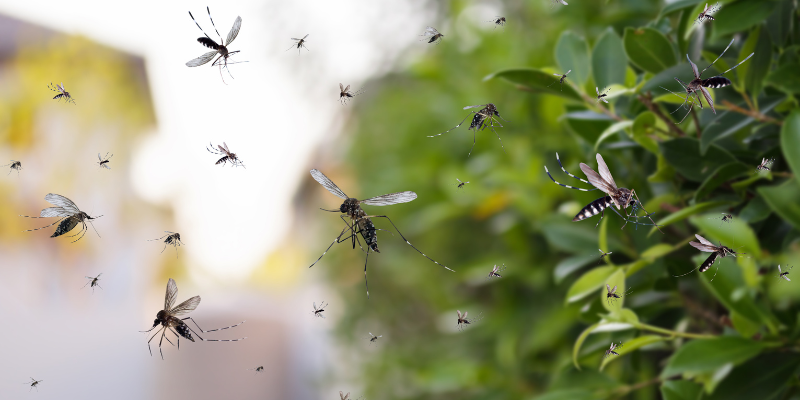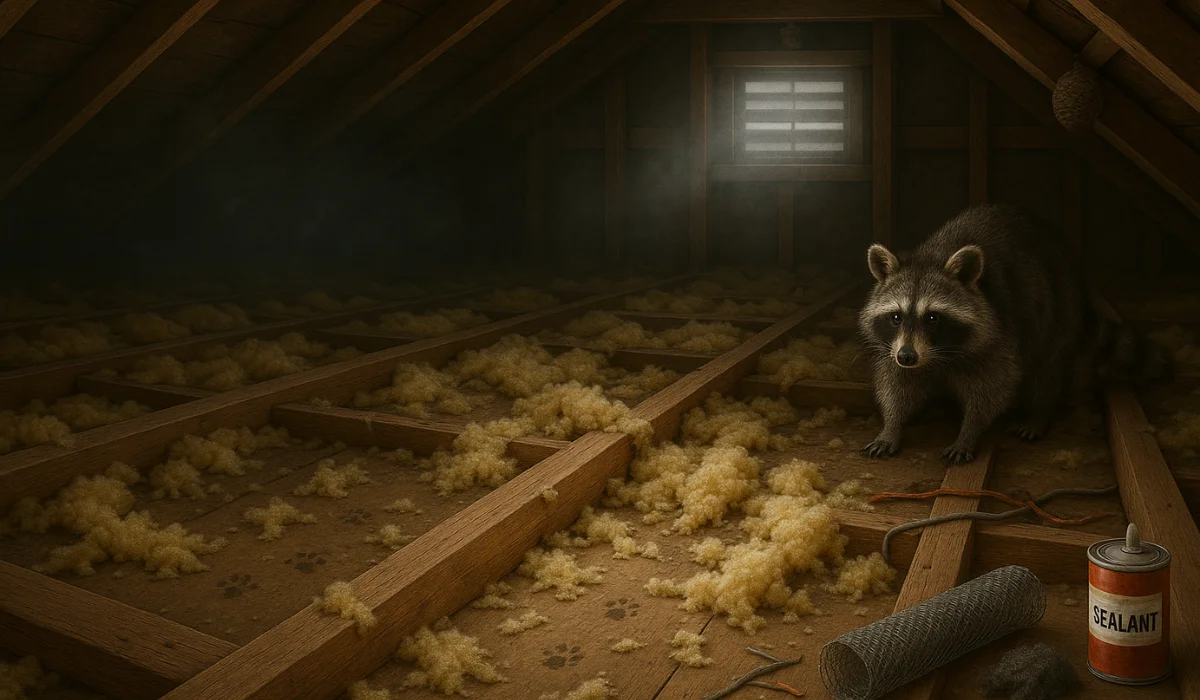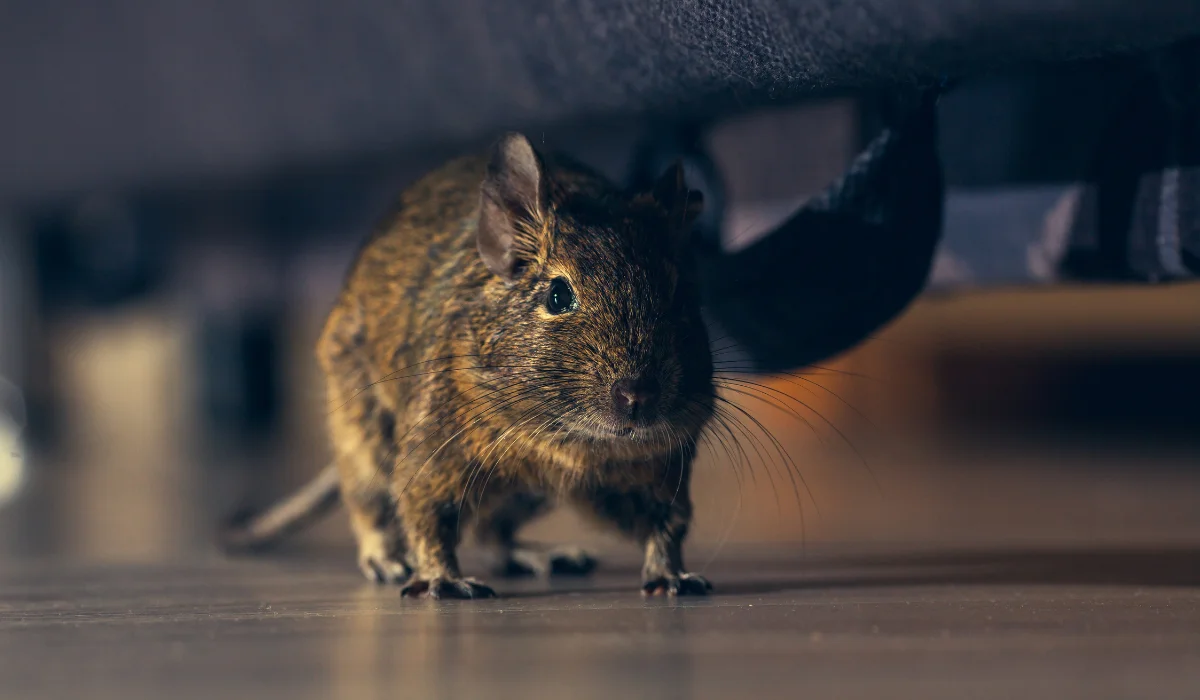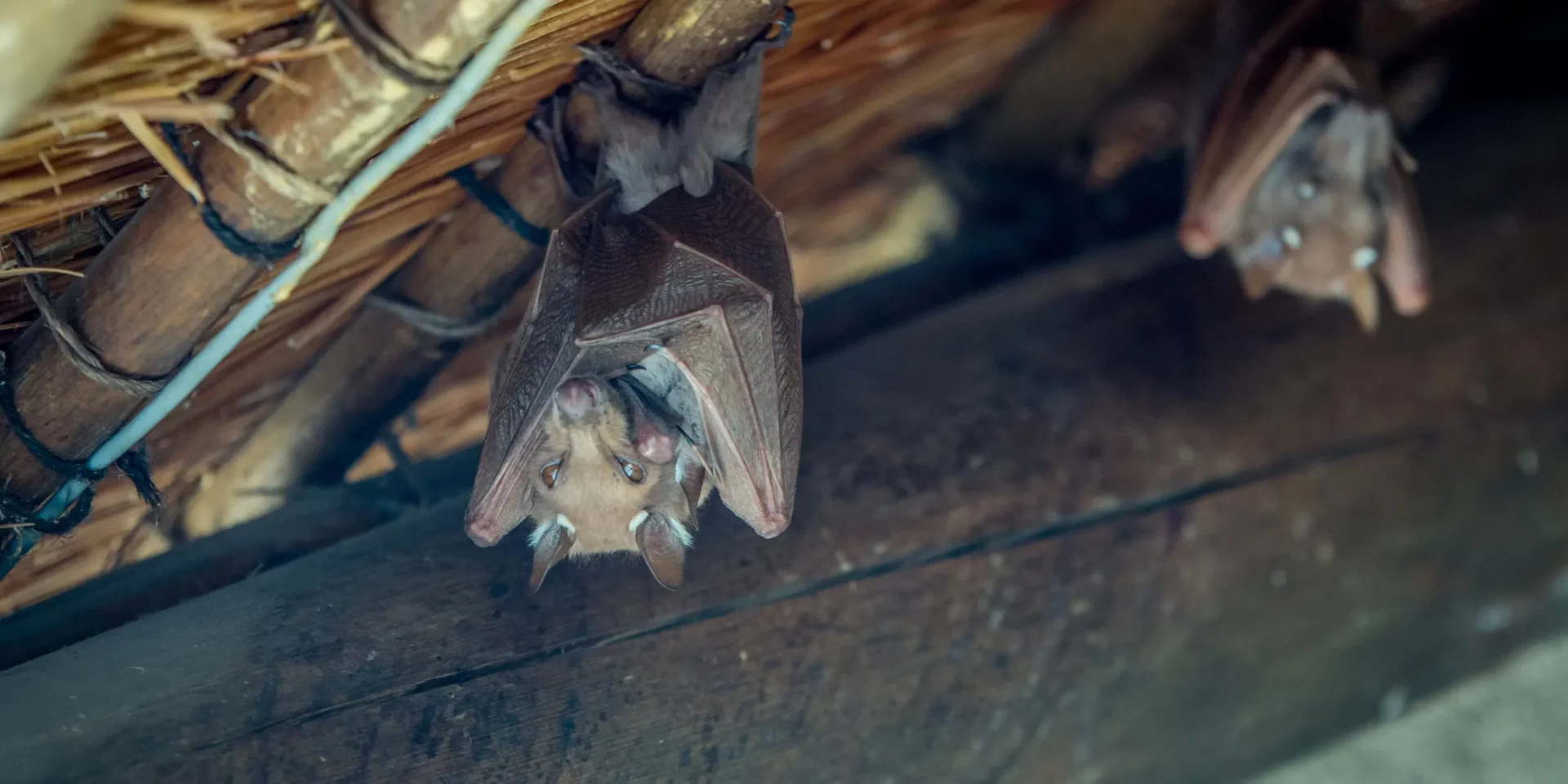While mosquitoes flourish in summer, they can continue to be active well into fall, with populations typically dwindling as the weather cools and becomes less hospitable for breeding.
But when exactly do temperatures drop enough to diminish mosquito activity notably? Could it be that the first cold snap or frost is what sends these pests packing for the year?
Keep reading for insights into the full spectrum of factors influencing when mosquitoes go away in Louisiana.
Key Takeaways
- Cooler temperatures and less rainfall beginning in late October contribute to the decline of mosquito activity in the state.
- Humidity and geographic location within Louisiana also play significant roles in the lifespan and density of mosquito populations.
- You can combat mosquitoes by wearing protective clothing, using effective repellents, and maintaining their property to disrupt breeding grounds.
- Professional mosquito control services in Louisiana offer comprehensive solutions, including barrier applications and habitat management, to reduce mosquito populations effectively.
WHEN DOES MOSQUITO SEASON END IN LOUISIANA
Various species of mosquitoes in Louisiana typically go away around late October into November. However, this varies since their activity is closely tied to the region’s climate.
Here’s what the year-round mosquito season looks like in Louisiana:
Start of the Mosquito Season
The onset of mosquito season in Louisiana typically begins as early as March. During this period, conditions are ideal for female mosquitoes to lay many mosquito eggs to start their life cycle.
Here are signs signaling the start of the season:
- Increasing temperatures above 50 degrees Fahrenheit
- The presence of standing water
- Higher humidity levels
- First sightings of adult mosquitoes
Peak Mosquito Months
The peak mosquito months in Louisiana are generally from May to October. This period aligns with the warmest and wettest months, creating perfect breeding conditions.
Here’s a close look at the average mosquito activity rates by month:
| Months | Average Mosquito Activity Rate |
| May | High |
| June | Very High |
| July | Very High |
| August | Very High |
| September | High |
| October | Moderate to High |
During these months, the number of adult mosquitoes peaks. This increases your risk of mosquito-borne illnesses like West Nile Virus and Zika virus.
Also, note that different mosquito species are most active at different times of the day. Some might be more active at dawn or dusk, while others feed throughout the day.
Decline of the Mosquito Season
The decline in mosquito season in Louisiana starts to become noticeable around late October into November when cooler temperatures and drier conditions set in.
Here are some indicators that the season is winding down:
- Nighttime temperatures consistently fall below 50 degrees Fahrenheit
- Reduction in the frequency of rainfall
- Noticeable drop in mosquito populations
- Lessened instances of mosquito bites
FACTORS INFLUENCING THE END OF MOSQUITO ACTIVITY IN LOUISIANA
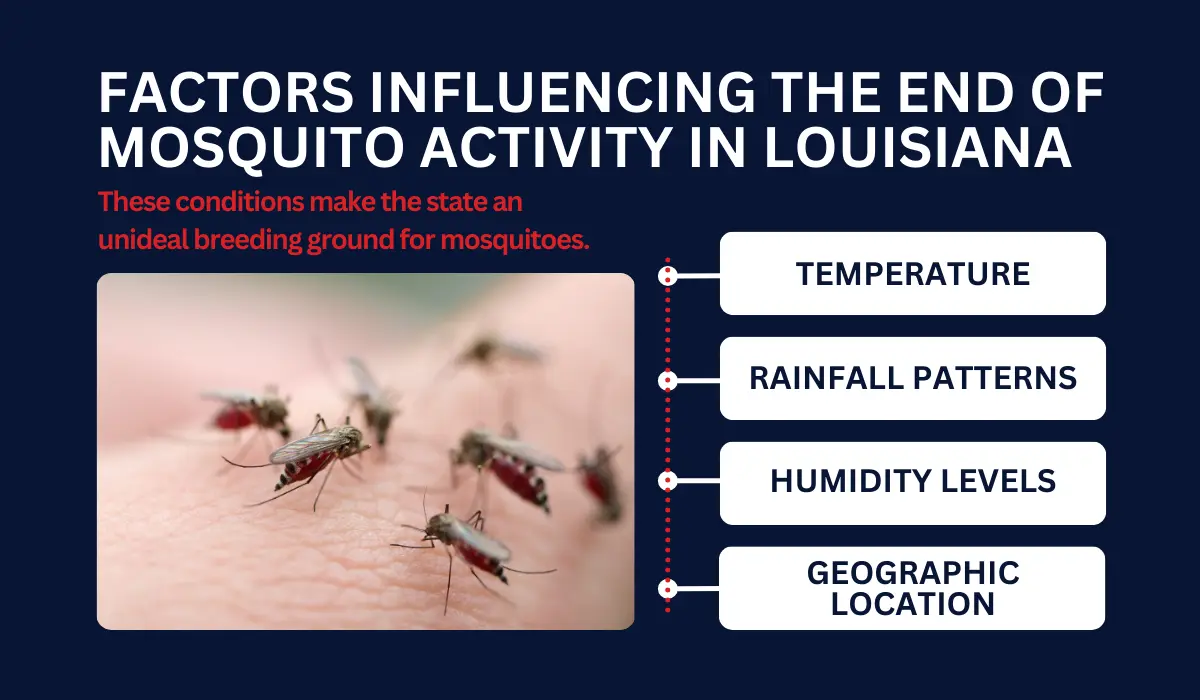
Several factors dictate the end of mosquito activity in Louisiana. These conditions make the state an unideal breeding ground for mosquitoes.
Temperature
Temperature significantly impacts mosquito activity in Louisiana. As temperatures drop below 50°F, mosquito breeding drastically decreases.
Marking the beginning of the end of mosquito activity, this slowdown period continues as temperatures remain below 70°F.
Here’s how weather temperatures affect the breeding activity level of mosquitoes in Louisiana:
| Temperature (°F) | Breeding Activity Level |
| Below 50 | Drastically decreased breeding |
| 50-59 | Reduced breeding |
| 60-69 | Moderate breeding |
| 70-79 | Enhanced breeding |
| 80 and above | Maximum breeding activity |
Rainfall Patterns
The end of mosquito activity coincides with the reduction of rainfall at the close of the wet season, typically after September. This results in:
- Fewer available breeding grounds in puddles.
- A natural decline in mosquito populations.
Humidity Levels
Like temperature, humidity plays a crucial role in sustaining mosquito populations. Higher humidity supports higher mosquito densities.
However, as humidity levels drop below 50%, mosquito density lowers significantly, aiding in the decline of their activity.
Here’s a look at the relationship between humidity level and mosquito density in Louisiana:
| Humidity Level (%) | Mosquito Density |
| Below 50 | Lower density |
| 50-59 | Moderate density |
| 60-69 | High density |
| 70-79 | Higher density |
| 80 and above | Highest density |
Geographic Location
Like other southern states like Texas and Florida, Louisiana exhibits varied regional geographical features influencing mosquito activity.
Here are critical observations across different regions:
- North Louisiana: As winter sets in, the drop in temperature significantly reduces mosquito populations.
- Central Louisiana: Cooler and drier conditions prevail, decreasing mosquito activity as breeding sites become less viable.
- South Louisiana: Despite traditionally high mosquito populations, the onset of cooler weather leads to a marked decrease in activity.
HOW TO PREVENT MOSQUITO BITES AND BREEDING
As Louisiana homeowners, you must take preventive measures against mosquito bites and eliminate breeding grounds for growing larvae.
Here’s what you need to know for getting rid of mosquitoes.
Personal Protective Measures
Wearing protective clothing and using suitable insect repellents can significantly reduce the risk of mosquito bites.
Here’s what you need to look for in mosquito repellents:
- DEET-based products
- Picaridin options
- IR3535 formulations
- Oil of Lemon Eucalyptus
Consider these protective clothing for your outfit of the day:
- Long sleeves
- Long pants
- Socks and closed shoes
- Hats with netting for areas with high mosquito activity
Home and Yard Maintenance Tips
As homeowners in Louisiana, you play a vital role in disrupting mosquitoes’ life cycle by maintaining your property.
Here are actionable steps you can take to help the community:
| Action Steps | Description |
| Clear Gutters | Ensure gutters are free from debris to prevent water stagnation. |
| Maintain Birdbaths | Change birdbath water at least once a week to disrupt mosquito breeding cycles. |
| Manage Ponds and Pools | Use circulating pumps in ponds and keep pools chlorinated and filtered. |
| Regularly Empty Containers | Empty containers that may collect rainwater, like pails and plant saucers. |
| Trim Vegetation | Keep bushes and lawns well-trimmed to reduce adult mosquito resting areas. |
| Mosquito Abatement Programs | Participate in community abatement programs for larger-scale control. |
PROFESSIONAL MOSQUITO CONTROL SOLUTIONS
When tackling the mosquito issue in Louisiana, professional mosquito services employ a strategic approach to mitigate these pests effectively.
At LaJaunie’s Pest Control, we provide a comprehensive mosquito abatement that holds up after rainfall. Here’s a close look at the methods we use to control mosquito populations:
- Mosquito Reduction Treatments: Treatments are conducted to reduce mosquito numbers substantially.
- Barrier Applications: Routine fogging and innovative systems provide a mosquito-repellent layer.
- Habitat Management: Specialists identify and tackle breeding grounds to cut infestations off.
- Biological Sterilization: Utilizing sterilization agents to hinder mosquitoes’ life cycle.
SHOULD YOU GET IN TOUCH WITH PEST CONTROL PROFESSIONALS NOW?
Mosquitoes can carry diseases, and your health isn’t something to gamble on. If the initial steps aren’t cutting it or other pests like termites appear, it might be time to cash in on professional help to keep you and your family safe.
Whether you’re in New Orleans or East Baton Rouge, seeking expert help should be easy. For immediate intervention for a severe infestation, let Lajaunie’s mosquito control specialists tailor a solution that’s right for your home.
For more information about the areas we service, visit our location page.
 By: LaJaunie's Pest Control
By: LaJaunie's Pest Control 